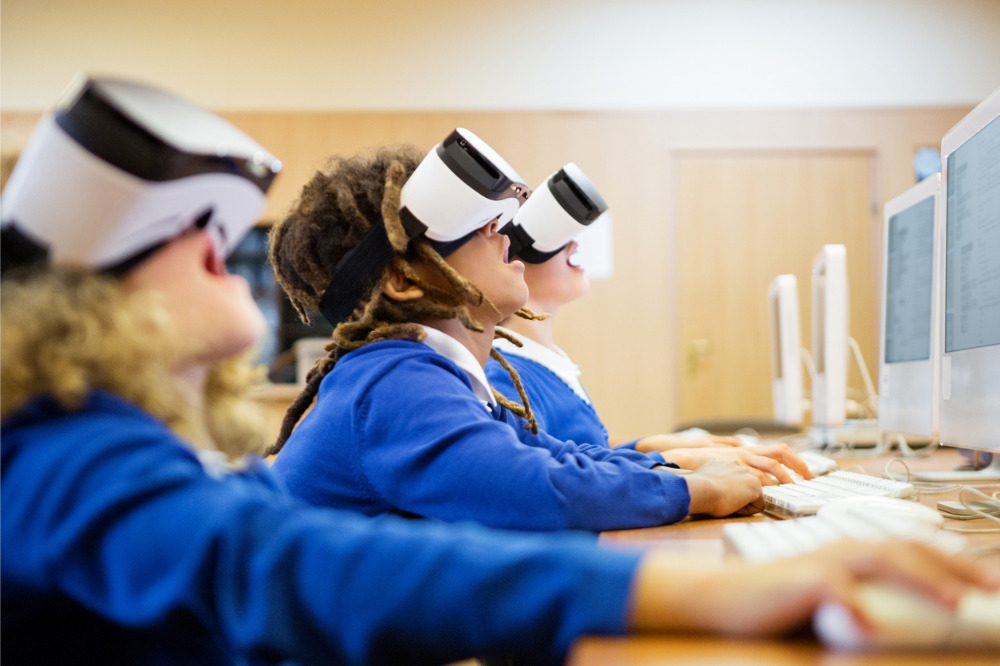
The field of EdTech is constantly evolving and changing the way we teach and learn. In the aftermath of the pandemic, EdTech plays an increasingly important role in facilitating elevated and high-quality remote learning environments. With the advances of technology like AI, the Metaverse, and augmented reality (AR), there’s never been a more exciting time to be working in the EdTech sector. From personalised learning to immersive experiences, these trends are providing online education providers and students with new tools to enhance the learning process and keep students more engaged than ever.
1. A learning experience tailored to you
Over the past decade, we’ve seen a real push for technology to be increasingly personalised in all aspects of our lives, and the education sector is no different. New and emerging EdTech means that online education providers are able to provide students with increasingly personalised learning experiences. Digital learning platforms are using artificial intelligence to create personalised study plans for each student dependant on their schedules, determine the areas in which students have knowledge gaps and provide tutors and support staff with more data to better support the individual student.
Course personalisation can be achieved in a variety of ways—for example, learning content could be based off the individual student’s key knowledge gaps to ensure that more time is spent covering the information the student needs to learn as opposed to the content that the student is already familiar with.
The fact is that the more personalised the learning journey is, the more effective, efficient and impactful the learning will be. At OES, we have a specialised analytics team who works to create all sorts of tools to better personalise our courses and support our students.
2. Transformative technology brings complex concepts to life
It’s no surprise that technology shapes how educators and students approach learning. From the reliance on physical books, to the creation of digital textbooks with hyperlinks, to the implementation of videos to better explain concepts, the evolution of technology means that students are constantly been given new ways to learn.
The benefits of technology enabling new ways of learning are especially prominent in the cases of complex concepts and courses. Today, while they also use textbooks and videos, anatomy students still learn about the processes of the human body largely through cadavers. Whilst it’s imperative for anatomy students to see the physical body up close, it can be hard to learn the complicated inner workings of the human body when so many components are small and can be hard to differentiate. Now, with transformative technology like virtual reality (VR) and augmented reality (AR), anatomy students could ‘enhance’ organs to a larger size to better visualise them and even ‘walk’ inside them.
The use of VR and AR in EdTech will only make complex concepts more accessible and comprehensible for students, and further engage them in the learning process.
3. Immersive, digital experiences
We’re increasingly finding that transformative technology means that the things you previously had to do in the physical world can be done at a similar—or better—level virtually. For example, we’re starting to see the creation of Metaversities—digital recreations (otherwise known as a ‘digital twin’) of university campuses that students can visit in the Metaverse to attend lectures digitally, make friends and explore the campus. These immersive, digital experiences mean that online education is increasingly sophisticated and engaging for students. Further, remote students can still benefit from the advantages of online learning, such as a lack of commute, whilst being able to experience campus life.
These virtual experiences can also be used to give students a safe space to practice their skills before heading into the real world. On behalf of a partner, OES created a digital hospital for nursing students to explore before going on placements. This digital experience means that students can trial some of the tasks they’ll be doing at the real hospital, allowing them to build confidence and practice in a safe environment first.
4. Content created for the people, by the people
The arrival of the internet was huge for the democratisation and accessibility of education, with people able to access hundreds of thousands of webpages at a click of a button.
In 2023, we’re seeing a new wave of democratisation in the online education space as more and more world leaders, industry titans and leading businesses work in collaboration with OPMs to create their own teaching content. Whilst before the only way to learn from such people would be through their biographies, today, learning platforms host classes on leadership from President Bill Clinton, Richard Branson’s teachings on entrepreneurship, and learn directly from Daniel Pink about sales and persuasion.
Instead of seeing these as new competitors, online education providers must embrace the opportunity to provide their students with teachings from top industry leaders. By partnering with top leaders and businesses, OPMs can better engage their students, expand their course content and distinguish themselves from other education providers.
5. Better, more effective learning tools
Advancements in learning technologies mean that online education providers are introducing more effective and modern learning tools for students. This makes learning easier, more efficient and suits a variety of student needs in an intuitive way based on the individual’s needs. These tools enable every student to learn in the best way that suits them, in the location that best suits them, and it makes learning more effective. With new ways of learning, the introduction of AR and VR, the learning experience for students has improved drastically. Technology has enabled a modernisation in student learning, creating a more immersive experience for students that enhances student interaction and makes the learning experience more innovative and enjoyable.
This article was written by OES, an organisation that designs, promotes and delivers high quality online program management services.


